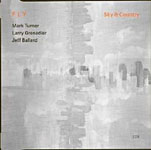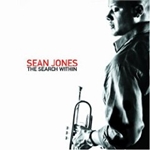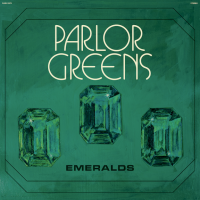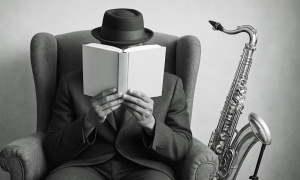Home » Jazz Articles » Interview » Fly: Complete Collaboration
Fly: Complete Collaboration
I think we all have this unique perspective from being sidemen for so much of our professional lives. Coming together as a band we were all very much aware that what makes a great solo is a collective effort.
 The Fly trio has just released its second CD—and its first for ECM—Sky & Country (2009). Bassist Larry Grenadier, drummer Jeff Ballard and saxophonist Mark Turner redefine the saxophone trio by making it an entirely democratic group, with compositional contributions from all three of its members.
The Fly trio has just released its second CD—and its first for ECM—Sky & Country (2009). Bassist Larry Grenadier, drummer Jeff Ballard and saxophonist Mark Turner redefine the saxophone trio by making it an entirely democratic group, with compositional contributions from all three of its members.
The trio approaches performance with an equally egalitarian philosophy that largely eschews conventional instrumental roles as well. Melody is just as likely to be heard coming from Ballard as it is Turner or Grenadier, while forward rhythmic motion can be as much the result of Turner's horn as it is Grenadier's bass or Ballard's kit.
All three have worked together in various projects for over a decade—Grenadier and Ballard being the other two-thirds of Brad Mehldau's trio since Day is Done (Nonesuch, 2005), when Ballard replaced the pianist's long-time drummer Jorge Rossy—though their musical partnership dates back to the mid-'90s, when they collaborated on pianist Danilo Perez's fourth release as a leader, Central Avenue (GRP, 1998). Grenadier has been a regular with Turner since the saxophonist's first release as a leader, Yam Yam (Criss Cross, 1995), while Turner has shared a musical partnership with Kurt Rosenwinkel that borders on the telepathic, and through the guitarist's discography has worked with Ballard on albums including Enemies of Energy (Verve, 2000) and The Next Step (Verve, 2001).
As much as Turner, Grenadier and Ballard have intersected over the years, it's rare that they've found opportunities to work together as a threesome. And so, Fly—whose 2004 self-titled debut on Savoy Jazz was critically well-received but popularly underappreciated—provides the three with the perfect opportunity to explore the chemistry they've felt together all along, in a context where they all get to call the shots. With the palpable musical growth of Sky & Country over Fly—it seems only right that an interview about Fly should be with the entire trio. No one voice dominates musically, so equally, no one voice should speak for the group.
All About Jazz: Larry and Jeff—you've know each other for a long time, right? How did you meet?
Larry Grenadier: Jeff and I met more than 25 years ago. We're both from northern California. We met at a Jamey Aebersold camp in the early '80s. We played that week and I remember really digging it. We really started playing regularly when I was in college and Jeff was living in San Francisco, in the late '80s. So we've been playing consistently for 20 or so years.
Jeff Ballard: Yeah, I moved to San Francisco in '86.
AAJ: And Jeff, you and Larry moved to New York around the same time.
JB: Yeah, I moved to New York about a year before Larry. And then Larry came out and we got an apartment together in Manhattan with saxophonist Donny McCaslin, who is also from California. And we both came across Mark in a bunch of different settings, including on Chick Corea's Originations (Stretch./Concord, 2000) record.
AAJ: What made the trio gel right away?
Mark Turner: We were all thinking similar things in terms of composition and the role of each musician in a trio setting. In other words, more of an equal playing field, as opposed to saxophone in front, which is what happens most of the time. That's a big part of it.
AAJ: Does Fly have a theme? Is there an approach to this trio that sets it apart or gives you an outlet different from other ensembles that you're in?
JB: It's all about equal participation in the group. So there really isn't a lead voice—it's very fluid. Sometimes I'll have a lead voice while everyone is playing. It's not just a drum solo. In the middle of a solo of Mark's, he'll leave some space and that fills up with Larry and me in there. So all of a sudden the rhythm section has really come up into the fore, in front. That equality is the big thing about this band. Everyone is handing the ball off, so to speak.
AAJ: It sounds like a situation where everyone is comfortable checking their egos at the door. You can just serve the music instead.
LG: It's true. I think we all have this unique perspective from being sidemen for so much of our professional lives. Coming together as a band, we were all very much aware that what makes a great solo is a collective effort. It's not just the soloist, but everybody else playing with them, too. So we brought that aesthetic to our band. It's all about collective playing, even when there's a soloist. I think that made this band very unique compared to what we'd been playing in before.
AAJ: How does the band work from a compositional standpoint? Do you bring completed tunes into the studio? Do you compose them together? Is it a mix?
 LG: We wrote one tune collectively, but other than that we brought in individual tunes. But we do write specifically for this band, which is important because we try to write songs that are complete even without a chordal instrument. So I really write for Mark and Jeff when I'm trying to write something for this band.
LG: We wrote one tune collectively, but other than that we brought in individual tunes. But we do write specifically for this band, which is important because we try to write songs that are complete even without a chordal instrument. So I really write for Mark and Jeff when I'm trying to write something for this band.
AAJ: This new record is on ECM. How did that come about?
JB: I had done some records for them with Charles Lloyd. So we just put it out there and they were into it. Now we're almost ready to put out the record.
MT: We approached them. Larry talked to ECM and said, "What do you think about this idea?"
AAJ: I've been interviewing a lot of ECM artists recently, and many have said some similar things about the way that ECM allows for the artist or the ensemble to do its thing without a lot of interference, but with some artistic guidance from [ECM founder and producer] Manfred [Eicher]. What's your experience been like?
MT: I'd say that's true for the most part. There is some input from Manfred, but it's always been pretty helpful and had a lot of truth to it.
LG: I think we have a pretty clear idea what we want. We play the way we play, and there don't seem to be any doubts. We don't need any help in a babysitting way. Manfred's right there with a bagful of experience. And he has his specific sound, so that's a big element that he brings to the recording.
AAJ: The three of you are so busy individually in projects that don't involve the other two. How did you carve out the time to prepare for this record?
MT: There's been a lot of time between the first one and this one. Almost three years.
AAJ: Do you make time to get together? Have you talked about it over the phone?
MT: We planned for it ahead of time, discussed each person's schedule. Part of it was just making time for playing gigs in town around the time of the recording. And there are some other strategic moments when we can play. That's really it.
JB: We have done tours. Even though we haven't been recording, we've been going to Europe and playing. So we've been as active as possible with the restraints of our schedules. But it's really a priority for us to keep this band going. We're hoping that with the new record out, we'll be playing more and more.
AAJ: When you get back together after being apart for a while, does it all just fall back into place?
JB: It really falls into place. That's the beauty of it. We've been playing together so long, the three of us—in this context and in other situations—that every time we hit, it's like, "Wow, here we are again." There's no lapse. The music continues.
LG: I wanted to say something. You asked about how we prepared for the recording. In writing for the band or the record, we also talk about what would be needed for the record. How about a ballad? How about something that's very rhythmic? So those are also considerations that we bring—what the book needs. Since we've playing tours and things, we've been able to introduce new tunes. So someone brings in a tune and we play it and they take it back and work on it.
AAJ: Are you planning a tour in support of this record?
 l:r Larry Grenadier, Mark Turner, Jeff Ballard
l:r Larry Grenadier, Mark Turner, Jeff Ballard
JB: Yeah, in April in the U.S. and Europe in May.
AAJ: Mark, can you talk about what happened to your hand and how your recovery is coming along?
MT: I had an accident with a power saw. I do work on my house. I cut the tendons on my index finger and my middle finder. It's actually progressing a lot better than I was told it would. Originally I thought I would not be able to play until the beginning of May. But they're telling me I may be able to play—not a lot, but moving my fingers on the keys—in January. So we'll see how that goes, but it's looking pretty good now.
Selected Discography
Fly, Sky & Country (ECM, 2009)
Fly, Fly (Savoy Jazz, 2004)
Tags
PREVIOUS / NEXT
Support All About Jazz
 All About Jazz has been a pillar of jazz since 1995, championing it as an art form and, more importantly, supporting the musicians who make it. Our enduring commitment has made "AAJ" one of the most culturally important websites of its kind, read by hundreds of thousands of fans, musicians and industry figures every month.
All About Jazz has been a pillar of jazz since 1995, championing it as an art form and, more importantly, supporting the musicians who make it. Our enduring commitment has made "AAJ" one of the most culturally important websites of its kind, read by hundreds of thousands of fans, musicians and industry figures every month.
























